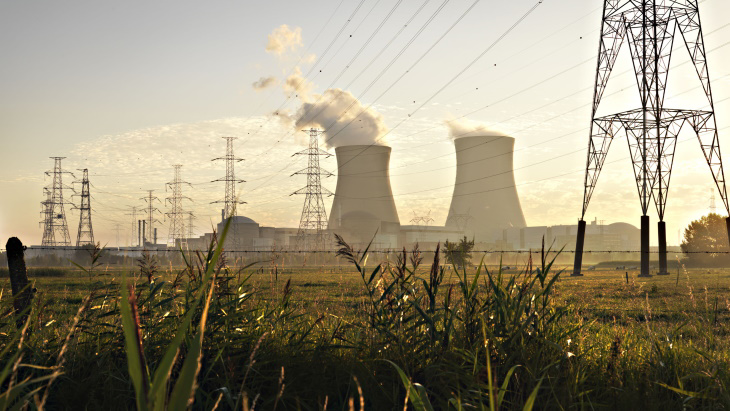A framework agreement to extend the operation of the Doel 4 and Tihange 3 power reactors by 10 years has been signed between French utility Engie and the Belgian federal government. Meanwhile, Belgium's Federal Agency for Nuclear Control (FANC) has set out "its expectations regarding nuclear safety" for the extended operation of the units.
 The Doel plant in Belgium (Image: Engie)
The Doel plant in Belgium (Image: Engie)On 29 June, Engie and the Belgian government signed an interim agreement defining the terms for the extended operation of the two reactors by ten years. At that time, a final agreement was expected this month.
Electrabel - the Belgian subsidiary of Engie - said the framework agreement, signed on 21 July, sets the framework for the continuation of negotiations between the Belgian state and Electrabel with a view to reaching a final and legally binding agreement, the 'transaction document', in October.
"This agreement confirms what was validated in the month of June (including the lump sum of EUR15 billion (USD16.6 billion) for waste management) and establishes the Flex LTO scenario as the base case for further negotiations," it noted.
This Flex LTO scenario is subject to certain unavoidable conditions to ensure nuclear safety, including: the on-time delivery of nuclear fuel by the manufacturer; improvements to plant design, based on the nuclear safety requirements recently transmitted to Electrabel by FANC; qualification of equipment important for safety to ensure correct operation in all conditions; certain work to ensure the operational safety of the existing facilities must be carried out within 2-4 months in the case of a Flex LTO; and the availability of highly specialised personnel and partner companies must be ensured, taking into account the tight schedule, which is even tighter in the case of a Flex LTO.
"If all these conditions are met, Engie Electrabel currently sees no major obstacles to a restart in November 2025," the company said.
At the request of the government, FANC has proposed the necessary amendments to the Royal Decree on the safety regulations for nuclear installations to allow the extension of Doel 4 and Tihange 3. FANC said the necessary safety improvements may be spread over time and must all be implemented by 2028. In this way it is also possible to operate Doel 4 and Tihange 3 over the winter 2025-2026.
FANC also submitted a note to Engie Electrabel setting out its expectations concerning the elements to be addressed in order to prepare and justify the long-term operation term of Doel 4 and Tihange 3, which are both scheduled to be taken offline in 2025 for maintenance and inspections following 40 years of operation.
The note specifies the conditions necessary to allow a resumption of operation in the short term after 40 years of operation and expectations for a continuation of longer-term operation for the new operating period.
"Based on the results of the periodic safety review, the measures necessary for continued operation with a level of safety equivalent to that achieved to date, must be carried out before the restart," FANC said. "With regard to the other actions identified (with the objective to further improve the level of safety), they will be included in an action plan to be carried out within three years, subject to duly justified exceptions. These other actions relate to modifications necessary to meet new regulatory requirements or to align as much as possible with current practices, norms and standards."
Engie Electrabel is now further developing action plans and associated timing for making safety improvements. FANC said it will have to approve them and will ensure that priority is given to the activities most important for nuclear safety.
"In order to prepare for long-term operation, special attention is brought to several aspects within this framework," FANC said. "This is the verification of 'preconditions', aspects related to human factors (skills, knowledge and behaviour), aging management and improvement of design. For the latter, regulatory requirements will have to be taken into account."
It added: "This approach has been defined taking into account the needs to ensure the security of electricity supply during the winter periods of 2025-2026 and 2026-2027 as well as the need to guarantee and demonstrate that the level of safety corresponds to the regulations in force."
Under a plan announced by Belgium's coalition government in December 2021, Doel 3 was shut down in September 2022, while Tihange 2 shut down at the end of January this year. The newer Doel 4 and Tihange 3 would be shut down by 2025. However, in March last year the Belgian government decided to start talks with Electrabel with a view to extending the operation of Doel 4 and Tihange 3, allowing for the retention of 2 GWe of nuclear generation capacity.
 The Doel plant in Belgium (Image: Engie)
The Doel plant in Belgium (Image: Engie)